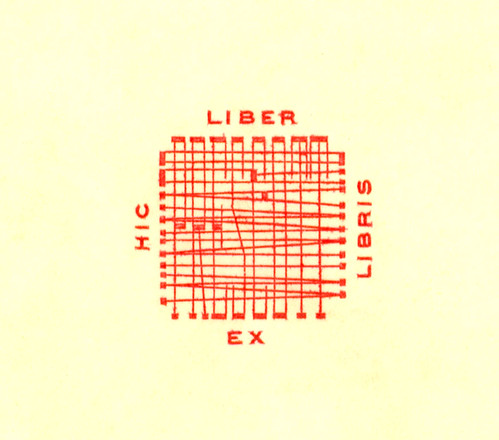Research @ the Pratt Libraries
Bookplate of Winward Prescott, via Pratt Institute Library's Flickr collection of book plates (click image to further explore)
To help you with jewelry-related research, this guide offers research tips and strategies. Learn how to find books, articles and images as well as avoid plagiarism, cite your sources and more! Need help? Contact us! (see right)
Evaluating Sources
The CRAP Test
Currency
- How recent is the information?
- Can you locate a date for when the resource was written/created/updated?
- Based on your topic, is it current enough?
- Why might the date matter for your topic?
Reliability
- What kind of information is included in the resource?
- Is content of the resource primarily opinion?
- Is is balanced or biased?
- Is there a Bibliography? In other words, does the creator provide references or sources for data or quotations?
Authority
- Can you determine who is the creator or author?
- What are the credentials (education, affiliation, expertise?)
- Is the publisher or sponsor reputable?
- Are they reputable?
- What is the publisher’s interest (if any) in this information?
- Are there advertisements on the website?
Purpose/Point of View
- What's the intent of the article? (to persuade you, to sell you something?)
- For web resources, what is the domain? (.com .edu, .gov?) How might this influence the purpose or point of view?
- For web resources, are there ads on the webpage? How do they related to the topic of the web resource? (for example an ad for ammunition next to an article on firearm legislation or against gun control)
- Is the author presenting fact or opinion?
Adapted from Dominican University
Brainstorming Search Terms
When doing jewelry-related research, begin by brainstorming keywords and concepts related to your topic. Then use these keywords as search terms when searching for images, articles and books in library databases and PrattCat, our library catalog.
Consider the following, depending on your topic:
Jewelry Form / Type - such as bracelet, brooch, necklace, ornament, ring, etc.
Material(s) - examples include beadwork, gem(s), plastic, metalwork, glass, bakelite, etc.
Technique(s) - such as carved, cast, cut, fabricated, filed, forged, metalsmithing, mounted, silversmithing, soldered, etc.
Style - this category may correspond to a particular time period. Examples include: art deco, contemporary, etc.
Subject(s) - what is the the primary subject of the work? Is the subject abstracted or organic? Is it a realistic depiction of a specific plant, creature, etc.?
Date - examples include a specific year, decade or decades, and century (2013, art deco or 1920s, 19th century, modern, contemporary, etc.).
Title of work - both the offical name and any alternate titles or spellings (including those of other languages).
Jeweler's Name - both his/her formal name and/or any nicknames or alternate name spellings.
What search terms can you think of? There's no one, correct search term (or search for that matter). In fact, using multiple search terms and conducting several searches is what pays off!
Combining Search Terms
Research is like a treasure hunt or solving a mystery.
We have to try to combine the right terms in the right place to find the information we need.
How should you combine search terms to find what you are looking for?
Broad Search
Search for information using the single most important term related to your topic. Use this type of search when looking for basic background information.
Specific Search
Search for information by combining key concepts using the words you have brainstormed. Each concept/word should be separated by the word "AND". Use this kind of search when looking for specific evidence related to your claim/thesis.
Getting Too Many Irrelevant Results?
Add more search terms for narrower results.
Getting Too Few Relevant Results?
Change, switch out, or remove some search terms for more accurate or broader results.
More Search Tips
Remember: It pays to search smart in library resources
use AND to combine search terms, creating results with overlap of 2 terms or concepts
use OR between search terms to generate more results
use NOT if you want to exclude a term or concept from your results
use quotation marks "__" around a phrase to search for concepts represented by a few words
use the wildcard * (an asterisk) at the end of the root of a word to get results containing all versions of a word

